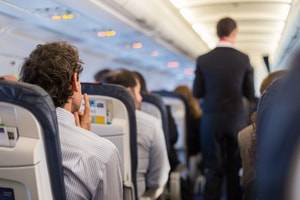KNOW YOUR RIGHTS: If I Am an Airline Passenger, What Happens if I Need to Use the Facilities When the Seat Belt Sign is On?
 By Attorney Ray Dall’Osto
By Attorney Ray Dall’Osto
On April 18, 2017, Kima Hamilton was removed from a Delta Airlines flight from Atlanta to Milwaukee because he had to go to the bathroom while the plane was on the tarmac. Mr. Hamilton and his attorney have filed a lawsuit in federal court alleging that how he was treated was unreasonable and was significantly different from how other similarly-situated passengers were treated, because of his race.
The lawsuit alleges that Mr. Hamilton had to urinate after the plane left the gate, and was told by crew members he would have to wait otherwise the plane would lose its spot in line. After telling the flight attendant it was an emergency and using the restroom, the plane returned to the gate and Mr. Hamilton was escorted off the plane by an airline employer and was questioned by the FBI.
In another case in 2015 involving a flight into O’Hare, the regional jet did not have a functioning toilet and passengers were without facilities for almost three hours, causing great discomfort and distress.
What Are the Rules That Airlines and Passengers Must Follow in These Situations?
U.S. Department of Transportation regulations on tarmac delays went into effect in April 2010, include the following:
- Airlines must return planes to the gate and let passengers off if the flight remains on the tarmac for three hours;
- Airlines must provide passengers with adequate food and water within the first two hours of any tarmac delay;
- Adequate toilet facilities must be maintained and made available to passengers during the delay; and
- Airlines must designate an employee to monitor flight delays and cancellations, respond to passenger complaints, and instruct passengers on the complaint filing process.
Exceptions to the deplaning requirements include when passenger safety and security are at risk, or if the plane's return to the gate would cause a major disruption of airport operations.
As the Chicago Tribune reported, airlines are not required to report nonfunctioning lavatories to the FAA, the U.S. Department of Transportation or any agency under the department.
DOT does impose aviation consumer rules (as opposed to FAA rules) that require functioning lavatories in two specific situations:
- During excessive ground delays, carriers are required to provide working lavatories, any needed medical attention and, within two hours of the start of the delay, access to food and water; and
- A working lavatory, one that meets standards set by the Americans With Disabilities Act, is required for passengers with disabilities on some aircraft. Those planes are generally twin-aisle aircraft delivered to a U.S. carrier since 1992 or to a foreign carrier since 2010.
There are times when you absolutely should not ignore the seat belt sign. Do not get up if there is obvious turbulence or if a pilot asks flight attendants to take a seat and prepare for a bumpy ride, take-off or landing. If your plane is taxiing, taking off, or landing, it is never advisable to remove your seat belt or attempt to go to the bathroom. Most airline accidents happen during this critical phase of flight, and your actions could endanger everyone’s safety and cause the take-off or approach to be aborted.
If a flight attendant intercepts you while you are en route to the bathroom under a lit seat belt sign, do not ignore his or her request. Return to your seat and buckle up. It is a violation of FAA rules for passengers to disobey crew member instructions. The pertinent regulations regarding “unruly passengers” can be found in this article from Slate online magazine.
If you face an urgent need to use the restroom when the seat belt light is on, ask the flight attendant. Try to work things out, because the plane cannot take off or land unless all passengers are in their seats—that is the rule. As the Tribune article notes, take precautions yourself to try to minimize the risk of such a situation arising. Complaints can be made to the airline and the DOT's Aviation Consumer Protection Division, which receives and tracks complaints from consumers on air-travel issues.
Depending on the particular facts as to what occurred, there might be grounds for further legal action. If you need to consult with an attorney in regard to your rights as a passenger on airlines, other common carriers or at airports, contact the compassionate Milwaukee criminal defense lawyers at Gimbel, Reilly, Guerin & Brown, LLP via our website or call 414-271-1440 and website link.
Source:
http://cbs58.com/news/milwaukee-man-forced-off-flight-after-bathroom-emergency-files-lawsuit-against-delta-airlines







